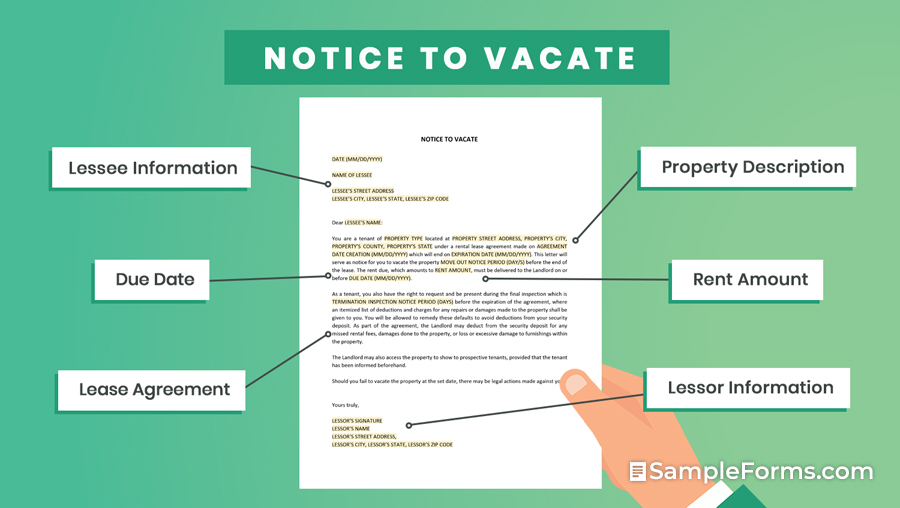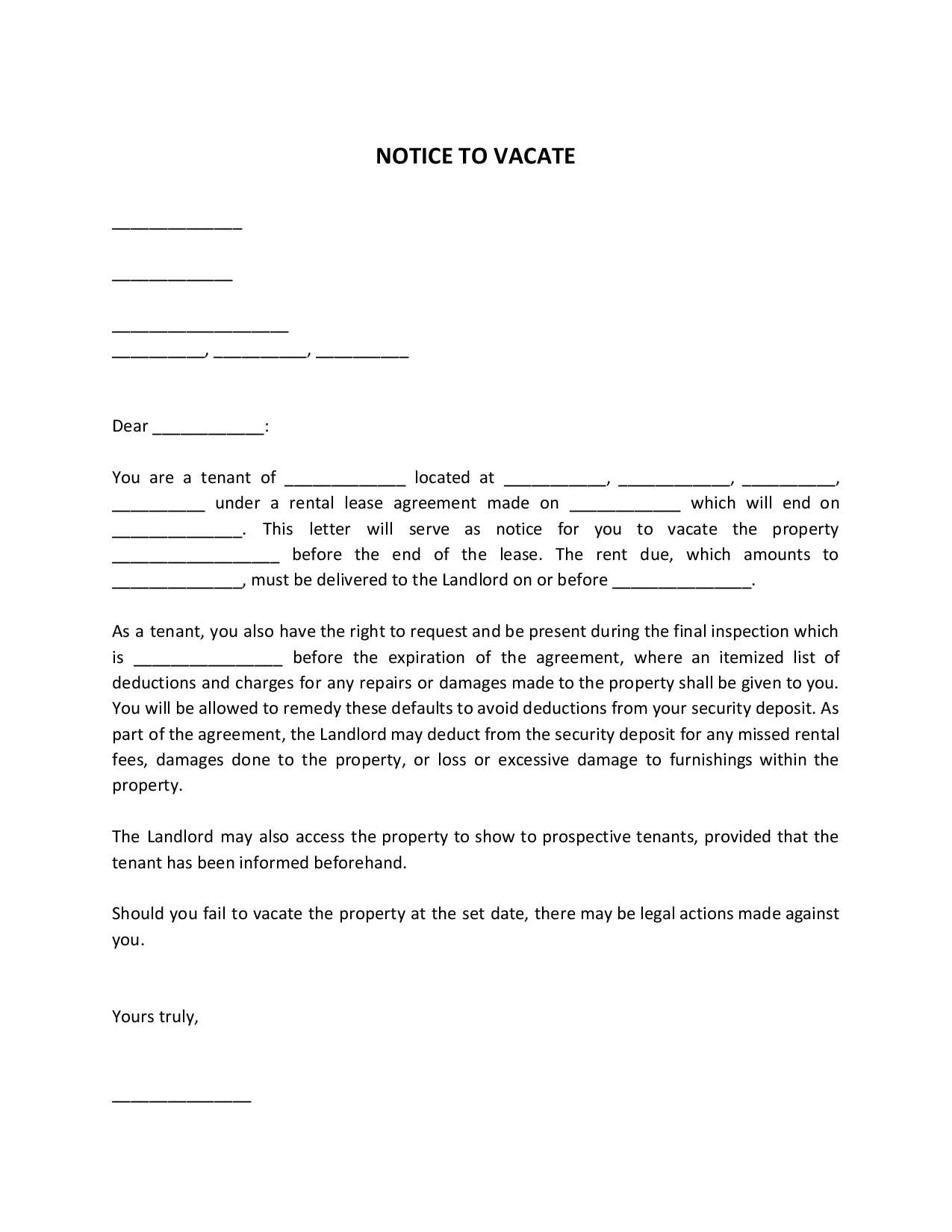- Eviction Notice Forms
- Power of Attorney Forms Forms
- Bill of Sale (Purchase Agreement) Forms
- Lease Agreement Forms
- Rental Application Forms
- Living Will Forms Forms
- Recommendation Letters Forms
- Resignation Letters Forms
- Release of Liability Agreement Forms
- Promissory Note Forms
- LLC Operating Agreement Forms
- Deed of Sale Forms
- Consent Form Forms
- Support Affidavit Forms
- Paternity Affidavit Forms
- Marital Affidavit Forms
- Financial Affidavit Forms
- Residential Affidavit Forms
- Affidavit of Identity Forms
- Affidavit of Title Forms
- Employment Affidavit Forms
- Affidavit of Loss Forms
- Gift Affidavit Forms
- Small Estate Affidavit Forms
- Service Affidavit Forms
- Heirship Affidavit Forms
- Survivorship Affidavit Forms
- Desistance Affidavit Forms
- Discrepancy Affidavit Forms
- Guardianship Affidavit Forms
- Undertaking Affidavit Forms
- General Affidavit Forms
- Affidavit of Death Forms
Notice to Vacate
A notice can signify something ominous or hopeful to the tenant, depending on the experience of their stay. They might be terrified of being asked to leave because of an offense committed, or they might be delighted to leave because of a bad experience. Either way, the notice acts as a reminder that they are due to leave in a day to give them ample time to prepare before moving out. Below is a piece of brief information on how to craft a professional notice to vacate to end things on a good note. Read More
What Is a Notice to Vacate?

A notice to vacate is a written notice written and sent by the landlord, the tenant signifying the end of a tenancy. This notice can either represent the end of a tenancy or eviction warning due to infringement. But the latter is mostly the reason for sending it. The letter to vacate can also come from the tenant. The notice is sent several days before the expected end date, depending on the State’s minimum requirements.
How to Write a Notice to Vacate?
A notice to vacate does not necessarily mean that the tenant has to leave the premises immediately. In some cases, the tenant may be given a chance to remedy the violation, given that the tenant will fix it in the given period. If the tenant fails to remedy it, then they will be asked to quit and deliver possession of the premises at a certain date. This violation is commonly a monthly rent-related violation.
A notice to vacate is easy to make as long as you know its purpose. For helpful tips, read on below.
1. Start with the Date, Name/s of the Tenant/s, and the Tenant’s Address
The notice is a formal document—therefore, start it off with the date, name/s of the tenant/s, and the tenant’s address. If the tenant has subtenants, include their names as the recipient of the notice.
2. Indicate the Reason for Such Notice and the Date to Vacate
Be transparent in your notice and include the reason for such notice. Invite them for a walk-in inspection several days before the date of eviction to look for possible damages to be deducted from the security deposit. If the tenant has any remaining rent that they are yet to pay, include that in the notice as well. Include the date to which they are expected to vacate the premises.
Provide an ultimatum to your tenant that if they fail to vacate the premises on the date stated, you may be forced to seek legal action to have them evicted from the premises.
3. Include Final Terms and Conditions for the Tenant
If damages there are on the premises, you could state in the notice that the tenant will be responsible for the cleaning and repairs needed to restore the premises to its original condition. You may also say that the security deposit is not equivalent to a payment for the previous and current month’s rent.
4. Include a Certificate of Service
In some cases, you may have to include a certificate in the notice itself. A certificate of service entails the date and how the notice was delivered to the tenant. It involves the date the message was sent, the name of the tenant, the method of delivery, and your signature.
5. Finish the Document with Your Signature
If your document does not include a certificate of service, you need to finish it with your signature and name underneath. Your signature is what makes the form valid and official. Your tenant may question its authenticity if your notice lacks the most crucial detail.
Frequently Asked Questions
Can the landlord evict the tenant for no reason?
Yes. According to Landlord Tenant Firms, the landlord can evict the tenant for no reason if the tenancy is month-to-month. Reasons for eviction should not be discrimination against race, religion, etc. and retaliation against the tenant.
How do I respond to a notice to vacate?
If you can remedy the violation, such as nonpayment of rent for example, first, you may pay the outstanding dues within the period that the landlord has given, second, move out of the premises within the period that the landlord has given, third, an answer must be filed with the judicial court. Fifth, a motion to stay must be filed with the court (Legal Nature).
Is an eviction notice the same as a notice to vacate?
No. An eviction notice is a court-mandated notice in which the tenant is given three to five days to vacate the premises. Whereas a notice to vacate is a notice signifying that the tenant should leave the premises.
How many days should a landlord give upon the giving of the notice?
The days depend on your State’s minimum requirements. You can look up your State’s minimum requirements regarding notices online.
Is an eviction record permanent?
No. An eviction record can be removed from your rental history, public record, and credit report after seven years. If landlords constantly reject you due to your eviction history, then you may have to wait for the seven years to pass before you can rent again.
Being the bearer of bad news is the last thing that a landlord should want but if the landlord’s reputation and means of livelihood are at stake, then they will be left with no choice. You might be harboring ill feelings for the tenant but these feelings shouldn’t be evident in the notice. Keep the delivery professional, direct, and free from obvious feelings of hatred towards the recipient. Be as transparent and fair as you can when crafting your notice. After all, the purpose of the notice is to preserve your investment and protect other tenants on the premises. The last thing you want to be labeled as is an irresponsible landlord, right? The key to reinforcing your ground rules to the end is by using a notice to vacate form.

